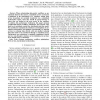Free Online Productivity Tools
i2Speak
i2Symbol
i2OCR
iTex2Img
iWeb2Print
iWeb2Shot
i2Type
iPdf2Split
iPdf2Merge
i2Bopomofo
i2Arabic
i2Style
i2Image
i2PDF
iLatex2Rtf
Sci2ools
117
click to vote
CCGRID
2008
IEEE
2008
IEEE
Orchestrating Data-Centric Workflows
When orchestrating data-centric workflows as are commonly found in the sciences, centralised servers can become a bottleneck to the performance of a workflow; output from service invocations are normally transferred via a centralised orchestration engine, when they should be passed directly to where they are needed at the next service in the workflow. To address this performance bottleneck, this paper presents a lightweight hybrid workflow architecture and concrete API, based on a centralised control flow, distributed data flow model. Our architecture maintains the robustness and simplicity of centralised orchestration, but facilitates choreography by allowing services to exchange data directly with one another, reducing data that needs to be transferred through a centralised server. Furthermore our architecture is standards compliment, flexible and is a non-disruptive solution; service definitions do not have to be altered prior to enactment.
CCGRID 2008 | Centralised | Centralised Orchestration | Centralised Server | Distributed And Parallel Computing |
Related Content
| Added | 12 Oct 2010 |
| Updated | 12 Oct 2010 |
| Type | Conference |
| Year | 2008 |
| Where | CCGRID |
| Authors | Adam Barker, Jon B. Weissman, Jano I. van Hemert |
Comments (0)

